For the four years bookended by England's Ashes triumphs of 2005 and 2009, Andrew "Freddie" Flintoff was the most famous sportsman in the UK. [The Ashes are a Test cricket series played between England and Australia since 1882.] It is one of the most celebrated rivalries in international cricket. The award of BBC sports personality of the year in 2005 reflected the esteem in which he was held, not just as a cricketer but as someone who played the game in the right spirit. The photograph of him bending down to commiserate with Australia's Brett Lee after the latter had taken his side to within a whisker of an extraordinary victory in the pivotal Edgbaston Test in 2005 came to represent the proper way to approach sport, and Freddie became a legend.
By 2009, however, injuries had taken their toll on Flintoff's bulky 6ft 4in frame, and just when he should have been at his peak he was forced to retire from Test cricket. He hoped to carry on playing for Lancashire, his native county, and to have a few big paydays playing easier-on-the-knees Twenty20 cricket in India, but even that proved impossible, and in 2010 at the age of just 32 he retired from all forms of the game.
It was cruel for cricket – he was the most entertaining, charismatic player of his generation – and even crueller for him. He had loved the game; it had consumed him from the age of six; and, as with all cricketers who have spent most of their lives on the field and had little time or cause to think about the world beyond the boundary rope, you wondered how he would cope. When he quit the UK for tax-friendly Dubai and started popping up in fashion and supermarket ads, as well as judging talent shows and commentating on darts, you worried for him. It all felt a bit tacky and directionless.
A few months ago he announced that he was aiming to become a professional boxer, and you worried even more. Or at least I did. I interviewed him in 2004 and wrote an article tracing his life, visiting his rough-and-tumble secondary school in Preston and the cricket club in Lytham St Annes where he first played as a boy (the chairman showed me the houses next to the ground that the teenage Flintoff used to pepper with sixes). I liked him when we met. He was already famous, but seemed rooted and almost ego-less; still a big bloke from Preston who could bowl fast with an ungainly action and give the ball a heck of a thump when the force was with him. Boxing seemed like a cheap stunt – he was going to be followed by Sky for a three-part series about his new sporting career – or a freak show.
So it is with some trepidation that I sit in a plush meeting room at Merlin Elite celebrity management, surrounded by photographs of other "celebrities" – Russell Watson, Martine McCutcheon, Louise Redknapp – waiting for Flintoff to arrive from a morning session at the gym. Redknapp's photograph shows her holding a leopard on a leash; I want Freddie to be above all that. His celebrity is real; he doesn't need a company to manage it.
When he finally arrives half an hour late, it is a much slimmer version of the cricketing Flintoff. Four months of training with former world featherweight champion Barry McGuigan and his fitness coach son Shane have knocked 40lb off Flintoff's weight and given him chiselled cheekbones, only offset slightly by a crooked nose caused by taking punches while sparring. The weight loss and the bashed-up nose dispose of the first question: this is no stunt; Flintoff intends to do it properly.
But why on earth does he want to have a professional fight at the age of 34? "It was an opportunity I couldn't pass up," he says. "I've been a boxing fan since I was a kid and watching [Mike] Tyson. I met Barry [McGuigan] just over a year ago. He let me have a go on the pads, and said: 'You've got a decent punch.'" When they met again a few months later, McGuigan offered to train him. His knees are no longer up to the pounding demands of bowling fast and he can't do any road running, but he can throw punches and move round the ring fast enough to outmanoeuvre lumbering heavyweights. At least, with McGuigan's tutelage, he believes he can.
Eight months on, Flintoff is about to step into the ring at the Manchester Arena on 30 November against American pro Richard Dawson – or, as the promoters are billing him, "Big Bad" Richard Dawson. Dawson is certainly big – 6ft 2in and 240lb – and boxing novice Flintoff will be hoping he's pretty bad, too, in a good way. McGuigan insists Dawson is no mug and that either of them could win.
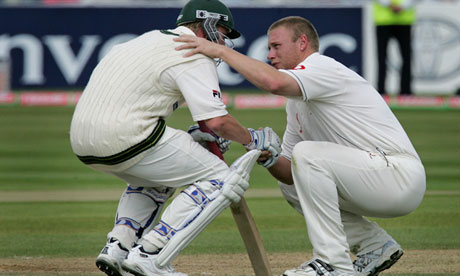 Flintoff consoles Australia’s Brett Lee after England narrowly win the Ashes in 2005. Photograph: Tom Jenkins
Flintoff consoles Australia’s Brett Lee after England narrowly win the Ashes in 2005. Photograph: Tom Jenkins
No stunt, then, but what about the freak show? Isn't he just performing for Sky's documentary? At this point he tells me something that reassures me both about the fight and his apparent directionlessness since giving up cricket. I had assumed Sky would have set up the whole project, but he says he and cameraman friend Paul Mungeam had had the idea of charting his progress and taken it to Sky. Their company is co-producing the series. "We'd spoken about doing some TV together and making our own stuff," says Flintoff, "and hopefully we'll continue to do that after this production." If this is a freak show, at least the freak is running it.
Most famous former England cricketers, in recent years at least, have made a seamless transition from dressing room to commentary box. "I never fancied that," says Flintoff. "I love cricket – don't get me wrong – and take my boys to the Oval. I watch it at home when the missus lets me put it on telly. But I'm only 34 and I don't want to be sitting behind a microphone talking about cricket. People just see you ageing on TV. It's like the lifestyle of the cricketer, but you don't get the thrill of playing." He's happy to do the odd day – especially when Australia return next summer – but he doesn't want to spend the next 30 years sitting in the Sky box blathering on. "The one thing I know about myself is I've got to be into something to do it. I've got to be passionate about it." That was also the reason he ruled out appearing on Strictly Come Dancing. "I can't commit to something I'm not into, and I don't want to do something half-arsed."
Former England captain Michael Vaughan, who led the Ashes-winning side in 2005, took the cricketer's spot on Strictly for the current series. "He found his niche in ballroom," jokes Flintoff. "It's nice to see when people are having fun and enjoying themselves. We all find it difficult when we finish playing cricket or any sport. We all drift for a while. You're not going to get those feelings again that you had when you were playing, but you've got to find something that stimulates you." I mention that Vaughan has also dabbled in art, producing paintings by hitting paint-covered balls against a wall (he calls it "artballing"). "He's not the new Banksy, is he," says Flintoff.
The first year or so after retiring was difficult, but Flintoff now seems to have found his feet. He and his wife Rachael, along with their three young children, have quit the dream world of Dubai and moved to Surrey. "We were in Dubai for 18 months, but I was missing home and we kept coming back," he says. Their home in Cobham is still footballer belt – all Southfork-style houses and Range Rovers with tinted windows – but at least it's marginally more real than Dubai. Flintoff says he would prefer to be in the north of England, where many of his friends are, but he needs to be close to London for commercial reasons.
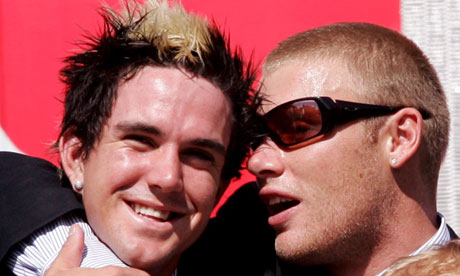 Celebrating the 2005 Ashes victory with Kevin Pietersen. Photograph: Graeme Robertson
Celebrating the 2005 Ashes victory with Kevin Pietersen. Photograph: Graeme Robertson
Life after sporting retirement interests Flintoff, and not just because he has had to confront it. We talk about Ashley Giles, who played alongside Flintoff in the Ashes-winning side of 2005 and is now making an impressive career as a coach. Did coaching ever appeal to Freddie?" He is dumbfounded when I suggest this. "Coaching?" he says. "Did you see me captain?"
His tenure as England captain was indeed a disaster. His team were whitewashed 5-0 in the Ashes series of 2006-7 in Australia, and he was relegated to vice-captain. He was then stripped of that post at the 2007 World Cup in the West Indies after falling out of a pedalo – or "fredalo" as it was quickly christened – when the worse for drink. Drink, as was demonstrated by his bleary-eyed appearance at a post-Ashes reception at 10 Downing Street in 2005, was sometimes his undoing. For the past two months, while preparing for his debut fight, he says he hasn't touched a drop.
The most telling project Flintoff has been involved in since his retirement was presenting a BBC documentary in January about depression among sports stars. Why did he make that? "It's something that I'd seen in other people [especially his close friend, the England fast bowler Steve Harmison], and then retrospectively looking back at my career I realised that I'd felt like that at times, and after I retired I found it hard. In the programme I never expected to give away as much about myself as I did. But I thought that because I was talking to my best mate Steve and to [the boxer] Ricky Hatton [another good friend from Manchester], it would be wrong for me not to speak about my experience. I found it very helpful."
In the first of the documentaries charting his progress as a boxer, he revisits some of those themes, admitting that he was bullied at school because of his prowess as a cricketer and that when he was labelled fat in his early 20s he became bulimic, sticking his fingers down his throat to make himself throw up. Because of his size and bluffness, he has been treated as a hearty – the first person you look to on the field for leadership in a crisis, "someone you'd want beside you in the trenches" as his former manager Neil Fairbrother once described him to me – but in reality he is complicated, and some of his issues with binge drinking during his career may have been related to depression.
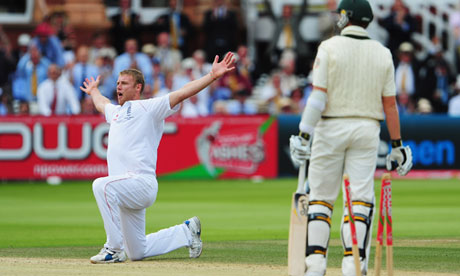 Flintoff milks the crowd's applause after taking his fifth wicket against Australia in 2009. Photograph: Mike Hewitt
Flintoff milks the crowd's applause after taking his fifth wicket against Australia in 2009. Photograph: Mike Hewitt
He also admits to disliking confrontation – a problem for a boxer, as McGuigan recognises. In the new TV series, when Flintoff rattles one of his sparring partners with a powerful punch, he looks anxious and immediately goes over to check that his opponent is OK. McGuigan has to point out that this is not the idea. "This is the hurt business," he tells Flintoff. It really isn't cricket, where the confrontation is a little less visceral.
Flintoff still misses cricket but has learned to live without it. "The cricket feels like a previous life," he says. "I was in a hospitality box last year at Lord's. It was raining and they showed an old game from 2009 – the Lord's Test where I got a few wickets – and at no point watching it did I identify it as me. I was just watching a game of cricket and watching some bloke carrying on on one knee [the famous moment when Flintoff knelt down to milk the crowd's applause after taking his fifth wicket in the Australian innings]. It seems like a previous life."
England's first Test in India is getting under way when we meet. Does he wish he was out there? "I think that's starting to go a little bit." He says he misses being involved with Lancashire more. Just before we met, he had been in Manchester and met the county captain Glen Chapple. When they talked about Lancashire's plans, Flintoff realised how much he missed it. "I'd like to be getting ready for the new season," he says. "I wanted to give back to Lancashire because they had been so good to me."
His old muckers Harmison and Matthew Hoggard, part of the famous fast-bowling quartet with which England ambushed Australia in 2005, are nearing the end of their careers, and Flintoff says they will find it tough at first. "It'll come as a shock. One thing I missed was the routine. I didn't particularly like it when I played, but it's nice to have." Professional sport – especially an all-consuming, 50-hours-a-week one such as cricket – provides structure and purpose, and when it goes you are cast adrift. That in part is why Flintoff has started boxing: it provides discipline and a new challenge. "It's stirred all those feelings again of competition and structure and getting fit," he says.
But it isn't, as I had feared before we met, a desperate attempt to recreate what was taken away from him when he had to retire from cricket. He's doing it because he wanted to, not because some inner demon was telling him he had to. "I only do things that I want to do," he insists. I take that as a promise. So, no reality TV, no Strictly, no leopard pictures. Freddie is bigger than that.
 Flintoff consoles Australia’s Brett Lee after England narrowly win the Ashes in 2005. Photograph: Tom Jenkins
Flintoff consoles Australia’s Brett Lee after England narrowly win the Ashes in 2005. Photograph: Tom Jenkins Celebrating the 2005 Ashes victory with Kevin Pietersen. Photograph: Graeme Robertson
Celebrating the 2005 Ashes victory with Kevin Pietersen. Photograph: Graeme Robertson Flintoff milks the crowd's applause after taking his fifth wicket against Australia in 2009. Photograph: Mike Hewitt
Flintoff milks the crowd's applause after taking his fifth wicket against Australia in 2009. Photograph: Mike Hewitt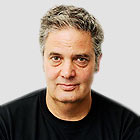

 >br>
>br>

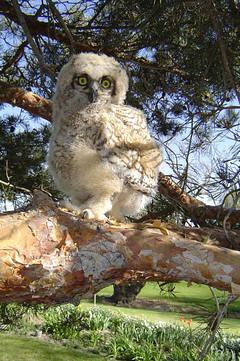





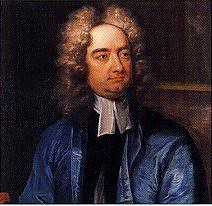

No comments:
Post a Comment